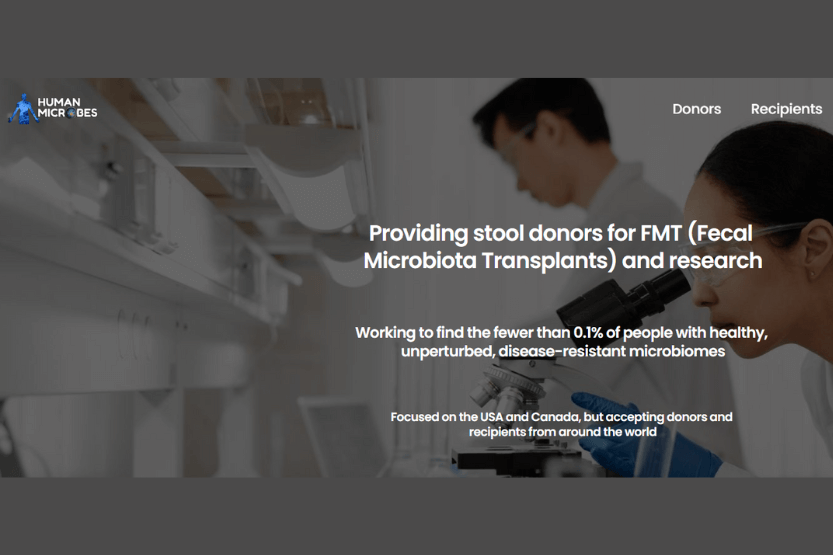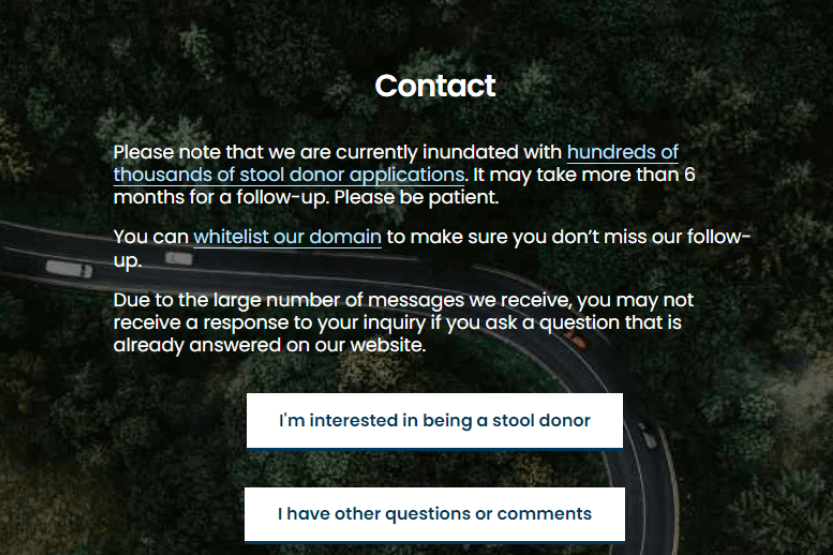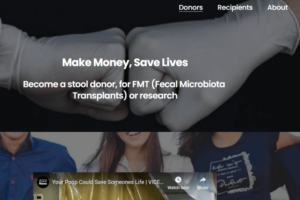Human Microbes is an organization that specializes in providing stool donors for fecal microbiota transplantation (FMT) and research purposes. FMT is a medical procedure that involves transferring fecal matter from a healthy donor to a patient suffering from a disease or infection.
This procedure has been shown to be effective in treating certain infections, such as Clostridioides difficile (C. difficile) infections, which are caused by an overgrowth of harmful bacteria in the gut.
Human Microbes focuses on providing high-quality donors who meet strict criteria. The organization’s donors are typically young, healthy athletes who have a diverse and robust gut microbiome.
The gut microbiome is the collection of microorganisms, including bacteria, viruses, archaea, and fungi, that live in the human digestive tract. These trillions of microbes play a crucial role in human health, influencing everything from digestion to immune function to mental health.
Human Microbes also conducts research into the gut microbiome and its role in human health and disease.
The organization is part of the Human Microbiome Project (HMP), a research initiative funded by the National Institutes of Health (NIH) that aims to understand the microbiome’s impact on human health.
Through its research and donor services, Human Microbes is contributing to a growing body of knowledge about the human microbiome and its potential for improving health outcomes.
What Does HumanMicrobes.Org Do?

HumanMicrobes.org is a stool donor network that operates in the USA and Canada, but accepts stool donors from around the world. The organization is run by a team of individuals and professionals interested in the microbiome and its implications for health and well-being.
The primary focus of HumanMicrobes.org is to provide fecal microbiota transplants (FMT) and to conduct research on the gut microbiome.
The gut microbiome is a complex ecosystem of trillions of microbes that live in our guts, comprising thousands of species of bacteria, viruses, archaea, and fungi, which impact and regulate every aspect of human health and development.
HumanMicrobes.org offers comprehensive information about the microbiome of the human body through their website.
The website was created by a team of researchers and healthcare professionals who are experts in the field of microbiome research. The website provides information on the latest research and developments in the field of microbiome research and FMT.
The organization has a large network of stool donors who are carefully screened and selected based on strict criteria. Donors must be in good health, have a healthy diet, and meet other specific requirements.
The organization uses state-of-the-art technology to process and store the stool samples, ensuring that they are of the highest quality.
HumanMicrobes.org is committed to conducting research on the gut microbiome and its implications for health and well-being. The organization collaborates with leading research institutions and healthcare professionals to conduct research on the gut microbiome and FMT.
The organization also offers educational resources and training programs for healthcare professionals interested in learning more about the microbiome and FMT.
Overall, HumanMicrobes.org is a reputable organization that is committed to providing high-quality stool donations for FMT and conducting research on the gut microbiome.
The organization is run by a team of experts in the field of microbiome research and is committed to advancing our understanding of the gut microbiome and its implications for human health and well-being.
Is HumanMicrobes org legit?
HumanMicrobes org is a website that offers stool donors for fecal microbiota transplantation (FMT) and research. The website claims to provide high-quality donors that are safe and effective. But the question remains: is HumanMicrobes org legit?
According to the website’s founder, the registry was created on August 14, 2020, and the website was last updated on July 9, 2022. The website is set to expire on August 14, 2025. The website uses a valid HTTPS connection, and the scam detector shows a trust score of 92/100, indicating its authenticity.
However, some people have raised concerns about the legitimacy of the website. One Reddit user claimed that the website is not medically legitimate and may not offer protection in the event something goes wrong.
Another user suggested that the website may be similar to the now-defunct medical testing company Theranos.
Despite these concerns, HumanMicrobes org has received positive reviews from customers who have used their services. One customer wrote on Trustpilot that the website’s founder, Michael, is “probably the most knowledgeable person in this field.”
Another customer claimed that the donor arranged by Michael was “hands down the highest quality” and better than donors from other FMT clinics around the world.
In conclusion, while there have been some concerns raised about the legitimacy of HumanMicrobes org, the website appears to be a legitimate source of high-quality stool donors for FMT and research.
Customers have reported positive experiences with the website’s services, and the website itself has a high trust score and uses a valid HTTPS connection.
What are the Qualifications for Donating Stool?

Human Microbes is a stool donor network that accepts stool donors from around the world, with a focus on the USA and Canada. Becoming a stool donor for FMT (Fecal Microbiota Transplants) or research is a serious commitment, and there are several qualifications that potential donors must meet.
Qualifications for Stool Donors
To ensure the safety and effectiveness of FMT, Human Microbes has strict criteria for selecting stool donors. The qualifications for becoming a stool donor are as follows:
- Good overall health: Donors must be in good overall health, with no history of chronic diseases, autoimmune disorders, or infectious diseases such as HIV, hepatitis, or tuberculosis.
- Healthy gut microbiome: Donors must have a healthy gut microbiome, with a diverse range of beneficial bacteria and no harmful pathogens.
- Regular bowel movements: Donors must have regular bowel movements, with a consistency that is not too hard or too loose.
- No recent antibiotic use: Donors must not have taken antibiotics within the past three months, as this can disrupt the gut microbiome.
- No recent travel: Donors must not have traveled outside of North America within the past three months, as this can increase the risk of exposure to infectious diseases.
- No high-risk behaviors: Donors must not engage in high-risk behaviors such as drug use or unprotected sex, as this can increase the risk of infectious diseases.
Donor Screening Process
To become a stool donor for Human Microbes, potential donors must complete a comprehensive screening process. This process includes:
- Completing a screening questionnaire: Donors must complete a detailed questionnaire about their medical history, lifestyle, and diet.
- Verification of stool type and physical fitness: Donors must provide a stool sample for analysis and undergo a physical exam to ensure they are healthy enough to donate.
- A video interview: Donors must participate in a video interview to discuss their medical history, lifestyle, and diet in more detail.
- Stool and blood testing: Donors must undergo stool and blood testing to ensure they meet the criteria for becoming a stool donor.
- Paid for by us or the recipient: Donors are compensated for their time and effort, with a payment of $500 per stool.
Overall, becoming a stool donor for Human Microbes is a serious commitment that requires meeting strict qualifications and undergoing a comprehensive screening process.
However, for those who meet the criteria, donating stool can be a way to help others and contribute to scientific research on the gut microbiome.
How to Donate
Human Microbes is always looking for stool donors to help with their research and fecal microbiota transplant (FMT) therapies. Becoming a donor is a simple process that involves a few steps.
Step 1: Check Eligibility
Before becoming a donor, it is important to check if you meet the eligibility criteria.
Human Microbes requires donors to be between the ages of 18 and 50, have a body mass index (BMI) of less than 30, and have no history of certain medical conditions such as cancer, autoimmune disorders, or infectious diseases.
Donors must also be willing to undergo a thorough screening process that includes blood and stool tests.
Step 2: Apply Online
If you meet the eligibility criteria, the next step is to apply online through the Human Microbes website.
The application process involves filling out a questionnaire that asks for basic information such as age, medical history, and lifestyle habits. Applicants are also asked to provide a stool sample for testing.
Step 3: Screening Process
After submitting the application, donors are contacted by a Human Microbes representative to schedule a screening appointment.
During the screening process, donors undergo a physical exam and provide additional blood and stool samples. The samples are tested for various pathogens and markers of health. If the donor passes the screening process, they are approved to become a donor.
Step 4: Donation Process
Once approved, donors can begin donating stool samples. Donors can choose to donate on their own schedule and set their own availability and prices. They can choose to make daily donations or wait for a large clinical trial. Donors are compensated for their time and effort.
Overall, becoming a stool donor for Human Microbes is a simple and rewarding process that can help advance research and therapies for many health conditions.
By following the steps outlined above, donors can make a valuable contribution to the field of microbiome research and help improve the lives of many people.
How Much Money Can You Get by Donating Your Stool?

Human Microbes is a stool donation program that compensates donors for their fecal matter. The compensation is based on the frequency and consistency of the stool samples. According to their website and NY Post’s article, donors can earn up to $500 per stool donation.
If a donor meets their stringent criteria and donates one stool per day, they can earn up to $15,000 per month or $180,000 per year.
The compensation offered by Human Microbes is one of the highest in the industry. The program attracts donors who are willing to commit to a regular donation schedule. The program also covers all the costs associated with the donation process, including shipping and handling.
GoodNature is another stool donation program that pays donors for their fecal matter. The program pays $40 for each donation and requires donors to make a commitment to donate regularly. The program covers all the costs associated with the donation process, including shipping and handling.
It is important to note that donating stool is not a get-rich-quick scheme. The donation process involves a rigorous screening process to ensure the safety of the recipient. Donors must meet strict health requirements and undergo a series of tests to ensure that their stool is safe to use.
Hey there! Donating stool can be a way to make some extra cash, but it’s crucial to know the risks and what’s involved in the process. Do your homework, check out the program you’re interested in, and talk to your healthcare provider before diving in. Safety first!
Discover other websites I’ve recently reviewed below:
In Summary
Human Microbes is a website that provides information on stool donors for FMT (fecal microbiota transplantation) and research. The website offers guidance on where to start when looking for a donor, as well as information on becoming a donor.
It is important to note that finding a high-quality stool donor is not an easy task. According to research, fewer than 0.1% of the population qualifies to be a high-quality (safe and effective) stool donor.
Even after accepting 3 out of 700 (0.4%) donor applicants, one Danish group was still unable to find any ideal, highly effective donors.
Microbiology is the study of microorganisms, including bacteria, viruses, fungi, protozoa, and algae.
The Human Microbiome Project (HMP) developed research resources to enable the study of the microbial communities that live in and on our bodies and the roles they play in human health and disease.
Through the lens of human body system organization, students can learn how microbes can be helpful or harmful to humans. Microscopic study of the healthy human body has demonstrated that microbial cells outnumber human cells by about ten to one.
Until recently though, this abundant community of human-associated microbes remained largely unstudied, leaving their influence upon human development, physiology, immunity, and nutrition almost entirely unknown.
Overall, Human Microbes provides valuable information on stool donors for FMT and research, and the study of microbiology and the human microbiome is an important area of research that has the potential to greatly impact human health.




![Read more about the article How Long Is a Score in Years? [and Why It’s Called a Score]](https://howchimp.com/wp-content/uploads/2021/04/how-long-is-a-score-300x200.jpg)
